
atlas-mcp-server
A Model Context Protocol (MCP) server for ATLAS, a Neo4j-powered task management system for LLM Agents - implementing a three-tier architecture (Projects, Tasks, Knowledge) to manage complex workflows.
Stars: 112
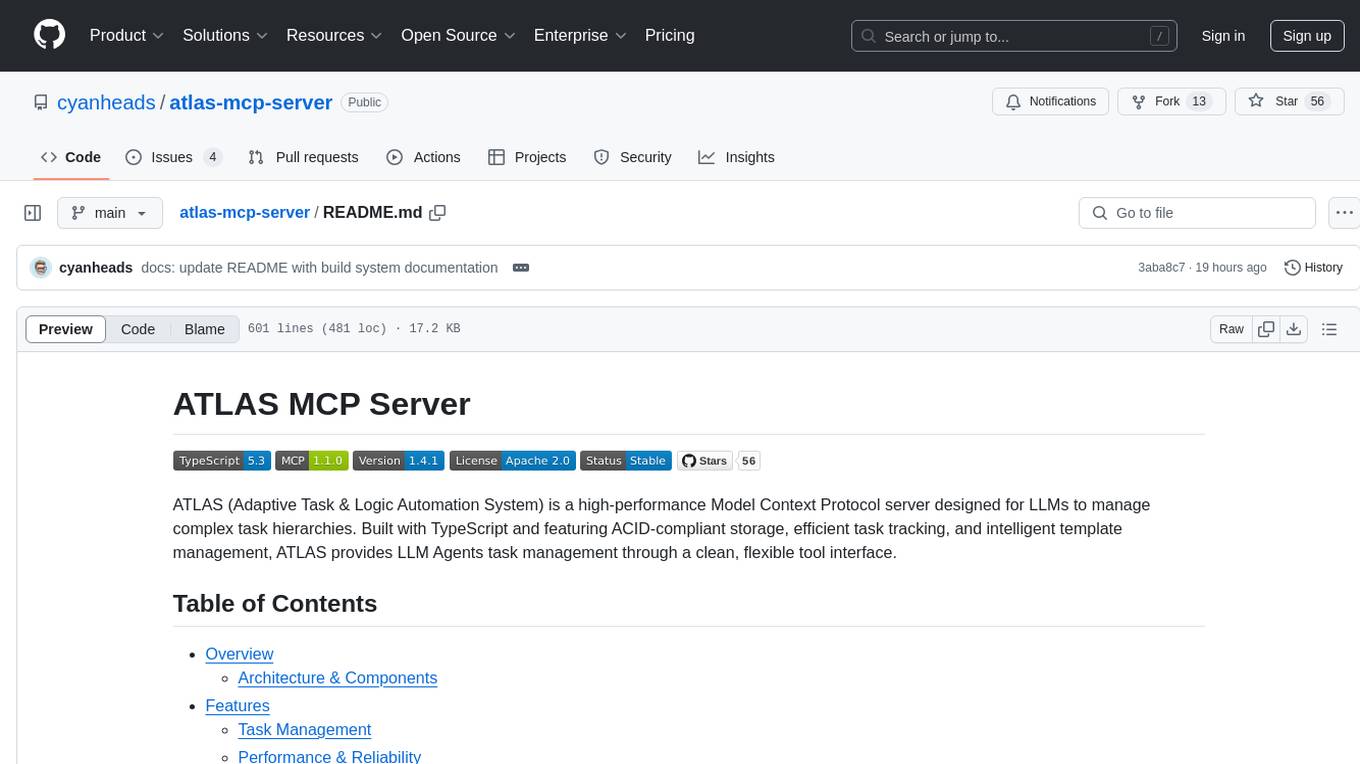
ATLAS (Adaptive Task & Logic Automation System) is a high-performance Model Context Protocol server designed for LLMs to manage complex task hierarchies. Built with TypeScript, it features ACID-compliant storage, efficient task tracking, and intelligent template management. ATLAS provides LLM Agents task management through a clean, flexible tool interface. The server implements the Model Context Protocol (MCP) for standardized communication between LLMs and external systems, offering hierarchical task organization, task state management, smart templates, enterprise features, and performance optimization.
README:
ATLAS (Adaptive Task & Logic Automation System) is a task management system for LLM Agents.
Built on a three-tier architecture:
+------------------------------------------+
| PROJECT |
|------------------------------------------|
| id: string |
| name: string |
| description: string |
| status: string |
| urls?: Array<{title: string, url: string}>|
| completionRequirements: string |
| outputFormat: string |
| taskType: string |
| createdAt: string |
| updatedAt: string |
+----------------+-------------------------+
| |
| |
v v
+----------------------------------+ +----------------------------------+
| TASK | | KNOWLEDGE |
|----------------------------------| |----------------------------------|
| id: string | | id: string |
| projectId: string | | projectId: string |
| title: string | | text: string |
| description: string | | tags?: string[] |
| priority: string | | domain: string |
| status: string | | citations?: string[] |
| assignedTo?: string | | createdAt: string |
| urls?: Array<{title: string, | | |
| url: string}> | | updatedAt: string |
| tags?: string[] | | |
| completionRequirements: string | | |
| outputFormat: string | | |
| taskType: string | | |
| createdAt: string | | |
| updatedAt: string | | |
+----------------------------------+ +----------------------------------+
Implemented as a Model Context Protocol (MCP) server, ATLAS allows LLM agents to interact with project management database, enabling managing projects, tasks, and knowledge items.
Important Version Note: Version 1.5.4 is the last version that uses SQLite as the database. Version 2.0 and onwards has been completely rewritten to use Neo4j, which requires either:
- Self-hosting using Docker (docker-compose included in repository)
- Using Neo4j AuraDB cloud service: https://neo4j.com/product/auradb/
Version 2.5.0 introduces a new 3-node system (Projects, Tasks, Knowledge) that replaces the previous structure.
- Overview
- Features
- Installation
- Configuration
- Project Structure
- Tools
- Resources
- Database Backup and Restore
- Examples
- Contributing
- License
ATLAS implements the Model Context Protocol (MCP), enabling standardized communication between LLMs and external systems through:
- Clients: Claude Desktop, IDEs, and other MCP-compatible clients
- Servers: Tools and resources for project, task, and knowledge management
- LLM Agents: AI models that leverage the server's management capabilities
The Atlas Platform integrates these components into a cohesive system:
- Project-Task Relationship: Projects contain tasks that represent actionable steps needed to achieve project goals. Tasks inherit context from their parent project while providing granular tracking of individual work items.
- Knowledge Integration: Both projects and tasks can be enriched with knowledge items, providing team members with necessary information and context.
- Dependency Management: Both projects and tasks support dependency relationships, allowing for complex workflows with prerequisites and sequential execution requirements.
- Unified Search: The platform provides cross-entity search capabilities, allowing users to find relevant projects, tasks, or knowledge based on various criteria.
- Comprehensive Tracking: Manage project metadata, statuses, and rich content (notes, links, etc.) with built-in support for bulk operations.
- Dependency & Relationship Handling: Automatically validate and track inter-project dependencies.
- Task Lifecycle Management: Create, track, and update tasks through their entire lifecycle.
- Prioritization & Categorization: Assign priority levels and categorize tasks with tags for better organization.
- Dependency Tracking: Establish task dependencies to create structured workflows.
- Structured Knowledge Repository: Maintain a searchable repository of project-related information.
- Domain Categorization: Organize knowledge by domain and tags for easy retrieval.
- Citation Support: Track sources and references for knowledge items.
- Native Relationship Management: Leverage Neo4j's ACID-compliant transactions and optimized queries for robust data integrity.
- Advanced Search & Scalability: Perform property-based searches with fuzzy matching and wildcards while maintaining high performance.
- Cross-Entity Search: Find relevant projects, tasks, or knowledge based on content, metadata, or relationships.
- Flexible Query Options: Support for case-insensitive, fuzzy, and advanced filtering options.
- Clone the repository:
git clone https://github.com/cyanheads/atlas-mcp-server.git
cd atlas-mcp-server- Install dependencies:
npm install- Configure Neo4j:
# Start Neo4j using Docker
docker-compose up -d- Build the project:
npm run buildCreate a .env file based on .env.example:
# Neo4j Configuration
NEO4J_URI=bolt://localhost:7687
NEO4J_USER=neo4j
NEO4J_PASSWORD=password2
# Application Configuration
LOG_LEVEL=info # debug, info, warn, error
NODE_ENV=development # development, productionAdd to your MCP client settings:
{
"mcpServers": {
"atlas": {
"command": "node",
"args": ["/path/to/atlas-mcp-server/dist/index.js"],
"env": {
"NEO4J_URI": "bolt://localhost:7687",
"NEO4J_USER": "neo4j",
"NEO4J_PASSWORD": "password2",
"LOG_LEVEL": "info",
"NODE_ENV": "production"
}
}
}
}The codebase follows a modular structure:
src/
├── config/ # Configuration management (index.ts)
├── index.ts # Main server entry point
├── mcp/ # MCP server implementation (server.ts)
│ ├── resources/ # MCP resource handlers (index.ts, types.ts, knowledge/, projects/, tasks/)
│ └── tools/ # MCP tool handlers (individual tool directories)
├── services/ # Core application services
│ └── neo4j/ # Neo4j database services (index.ts, driver.ts, backupRestoreService.ts, etc.)
├── types/ # Shared TypeScript type definitions (errors.ts, mcp.ts, tool.ts)
└── utils/ # Utility functions (logger.ts, errorHandler.ts, etc.)
Note: ID generation logic is implemented within the specific service files (e.g., projectService.ts, taskService.ts, knowledgeService.ts) rather than in a separate utility file.
ATLAS provides a comprehensive suite of tools for project, task, and knowledge management, callable via the Model Context Protocol.
| Tool Name | Description | Key Arguments |
|---|---|---|
atlas_project_create |
Creates new projects (single/bulk). |
mode ('single'/'bulk'), project details (name, description, status, urls, completionRequirements, dependencies, outputFormat, taskType), responseFormat ('formatted'/'json', optional). |
atlas_project_list |
Lists projects (all/details). |
mode ('all'/'details'), id (for details), filters (status, taskType), pagination (page, limit), includes (includeKnowledge, includeTasks), responseFormat ('formatted'/'json', optional). |
atlas_project_update |
Updates existing projects (single/bulk). |
mode ('single'/'bulk'), id, updates object, responseFormat ('formatted'/'json', optional). Bulk mode uses projects array. |
atlas_project_delete |
Deletes projects (single/bulk). |
mode ('single'/'bulk'), id (single) or projectIds array (bulk), responseFormat ('formatted'/'json', optional). |
| Tool Name | Description | Key Arguments |
|---|---|---|
atlas_task_create |
Creates new tasks (single/bulk). |
mode ('single'/'bulk'), projectId, task details (title, description, priority, status, assignedTo, tags, completionRequirements, dependencies, outputFormat, taskType), responseFormat ('formatted'/'json', optional). |
atlas_task_update |
Updates existing tasks (single/bulk). |
mode ('single'/'bulk'), id, updates object, responseFormat ('formatted'/'json', optional). Bulk mode uses tasks array. |
atlas_task_delete |
Deletes tasks (single/bulk). |
mode ('single'/'bulk'), id (single) or taskIds array (bulk), responseFormat ('formatted'/'json', optional). |
atlas_task_list |
Lists tasks for a specific project. |
projectId (required), filters (status, assignedTo, priority, tags, taskType), sorting (sortBy, sortDirection), pagination (page, limit), responseFormat ('formatted'/'json', optional). |
| Tool Name | Description | Key Arguments |
|---|---|---|
atlas_knowledge_add |
Adds new knowledge items (single/bulk). |
mode ('single'/'bulk'), projectId, knowledge details (text, tags, domain, citations), responseFormat ('formatted'/'json', optional). Bulk mode uses knowledge array. |
atlas_knowledge_delete |
Deletes knowledge items (single/bulk). |
mode ('single'/'bulk'), id (single) or knowledgeIds array (bulk), responseFormat ('formatted'/'json', optional). |
atlas_knowledge_list |
Lists knowledge items for a specific project. |
projectId (required), filters (tags, domain, search), pagination (page, limit), responseFormat ('formatted'/'json', optional). |
| Tool Name | Description | Key Arguments |
|---|---|---|
atlas_unified_search |
Performs unified search across entities. |
value (search term), property (optional), filters (entityTypes, taskType), options (caseInsensitive, fuzzy), pagination (page, limit), responseFormat ('formatted'/'json', optional). |
| Tool Name | Description | Key Arguments |
|---|---|---|
atlas_deep_research |
Initiates a structured deep research process by creating a hierarchical plan within the Atlas knowledge base. |
projectId (required), researchTopic (required), researchGoal (required), scopeDefinition (optional), subTopics (required array with questions and search queries), researchDomain (optional), initialTags (optional), planNodeId (optional), responseFormat (optional). |
| Tool Name | Description | Key Arguments |
|---|---|---|
atlas_database_clean |
Destructive: Completely resets the database, removing all projects, tasks, and knowledge. |
acknowledgement (must be set to true to confirm), responseFormat ('formatted'/'json', optional). |
ATLAS exposes project, task, and knowledge data through standard MCP resource endpoints.
| Resource Name | Description |
|---|---|
atlas://projects |
List of all projects in the Atlas platform with pagination support. |
atlas://tasks |
List of all tasks in the Atlas platform with pagination and filtering support. |
atlas://knowledge |
List of all knowledge items in the Atlas platform with pagination and filtering support. |
| Resource Name | Description |
|---|---|
atlas://projects/{projectId} |
Retrieves a single project by its unique identifier (projectId). |
atlas://tasks/{taskId} |
Retrieves a single task by its unique identifier (taskId). |
atlas://projects/{projectId}/tasks |
Retrieves all tasks belonging to a specific project (projectId). |
atlas://knowledge/{knowledgeId} |
Retrieves a single knowledge item by its unique identifier (knowledgeId). |
atlas://projects/{projectId}/knowledge |
Retrieves all knowledge items belonging to a specific project (projectId). |
ATLAS provides functionality to back up and restore the Neo4j database content. The core logic resides in src/services/neo4j/backupRestoreService.ts.
Important: The automatic backup functionality has been removed due to inefficiency. The call to triggerBackgroundBackup in src/services/neo4j/driver.ts is commented out with a note indicating it was removed. Please use the manual backup process described below to protect your data.
-
Mechanism: The backup process exports all
Project,Task, andKnowledgenodes, along with their relationships, into separate JSON files. -
Output: Each backup creates a timestamped directory (e.g.,
atlas-backup-YYYYMMDDHHMMSS) within the configured backup path (default:./atlas-backups/). This directory containsprojects.json,tasks.json,knowledge.json, andrelationships.json. -
Manual Backup: You can trigger a manual backup using the provided script:
This command executes
npm run db:backup
scripts/db-backup.ts, which calls theexportDatabasefunction.
- Mechanism: The restore process first completely clears the existing Neo4j database. Then, it imports nodes and relationships from the JSON files located in the specified backup directory.
- Warning: Restoring from a backup is a destructive operation. It will overwrite all current data in your Neo4j database.
-
Manual Restore: To restore the database from a backup directory, use the import script:
Replace
npm run db:import <path_to_backup_directory>
<path_to_backup_directory>with the actual path to the backup folder (e.g.,./atlas-backups/atlas-backup-20250326120000). This command executesscripts/db-import.ts, which calls theimportDatabasefunction. -
Relationship Handling: The import process attempts to recreate relationships based on the
idproperties stored within the nodes during export. Ensure your nodes have consistentidproperties for relationships to be restored correctly.
The examples/ directory contains practical examples demonstrating various features of the ATLAS MCP Server.
-
Backup Example: Located in
examples/backup-example/, this shows the structure and format of the JSON files generated by thenpm run db:backupcommand. See the Examples README for more details.
- Fork the repository
- Create a feature branch
- Commit your changes with a descriptive message
- Push to the branch
- Create a Pull Request
For bugs and feature requests, please create an issue.
Apache License 2.0
For Tasks:
Click tags to check more tools for each tasksFor Jobs:
Alternative AI tools for atlas-mcp-server
Similar Open Source Tools

atlas-mcp-server
ATLAS (Adaptive Task & Logic Automation System) is a high-performance Model Context Protocol server designed for LLMs to manage complex task hierarchies. Built with TypeScript, it features ACID-compliant storage, efficient task tracking, and intelligent template management. ATLAS provides LLM Agents task management through a clean, flexible tool interface. The server implements the Model Context Protocol (MCP) for standardized communication between LLMs and external systems, offering hierarchical task organization, task state management, smart templates, enterprise features, and performance optimization.
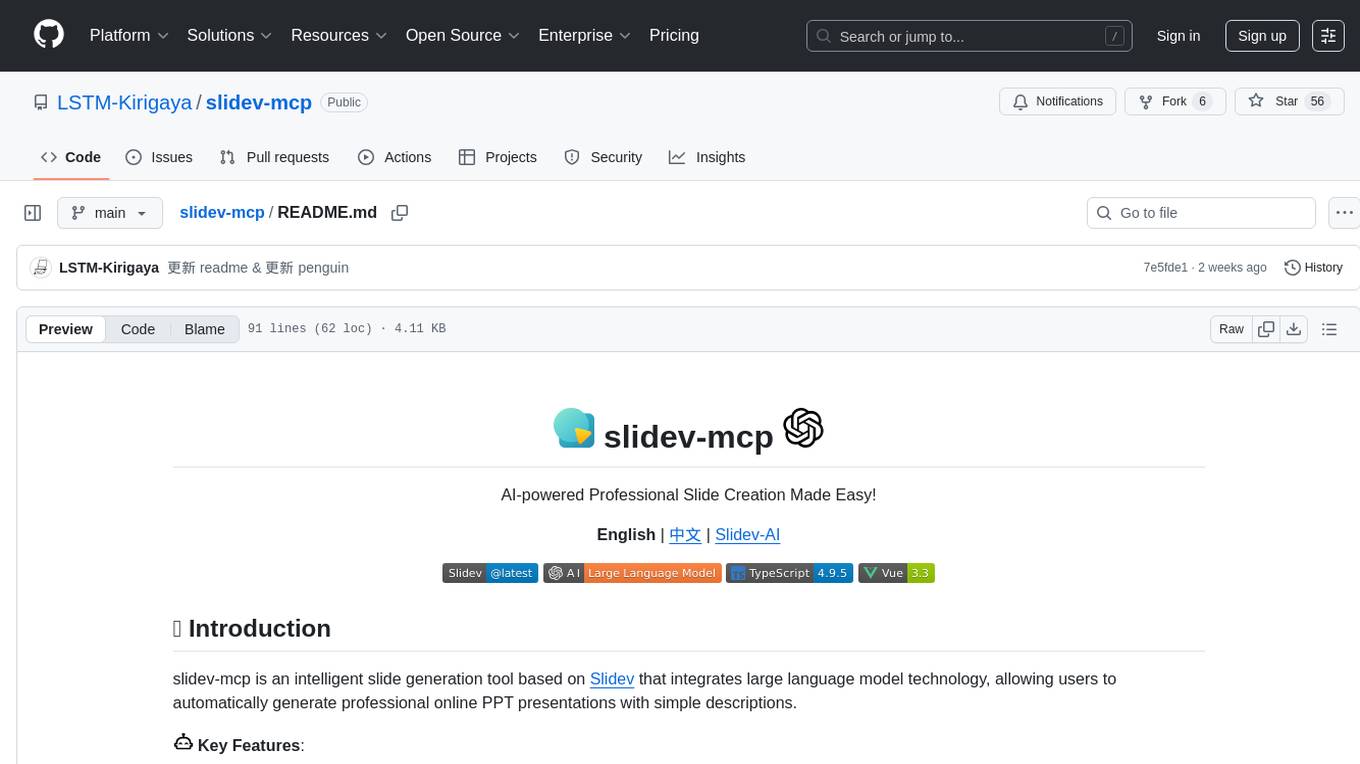
slidev-mcp
slidev-mcp is an intelligent slide generation tool based on Slidev that integrates large language model technology, allowing users to automatically generate professional online PPT presentations with simple descriptions. It dramatically lowers the barrier to using Slidev, provides natural language interactive slide creation, and offers automated generation of professional presentations. The tool also includes various features for environment and project management, slide content management, and utility tools to enhance the slide creation process.
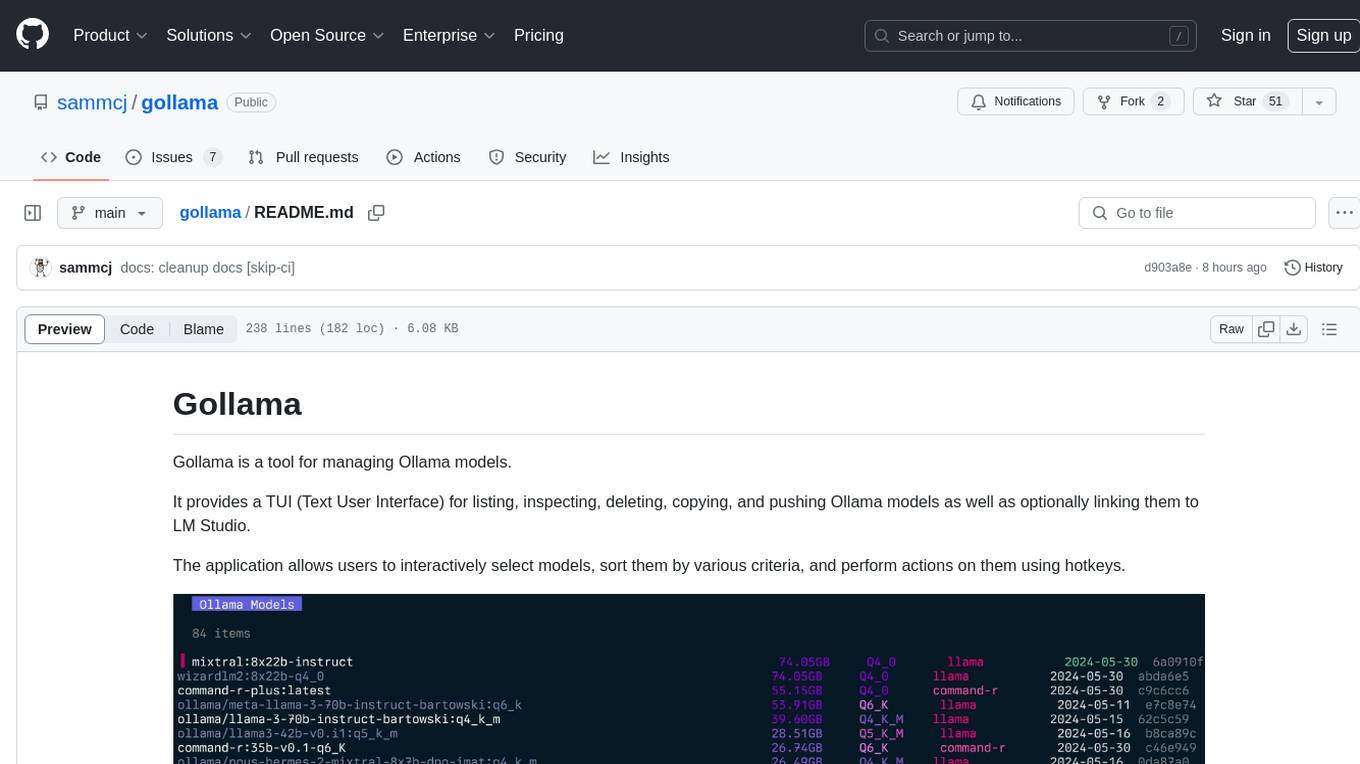
gollama
Gollama is a tool designed for managing Ollama models through a Text User Interface (TUI). Users can list, inspect, delete, copy, and push Ollama models, as well as link them to LM Studio. The application offers interactive model selection, sorting by various criteria, and actions using hotkeys. It provides features like sorting and filtering capabilities, displaying model metadata, model linking, copying, pushing, and more. Gollama aims to be user-friendly and useful for managing models, especially for cleaning up old models.
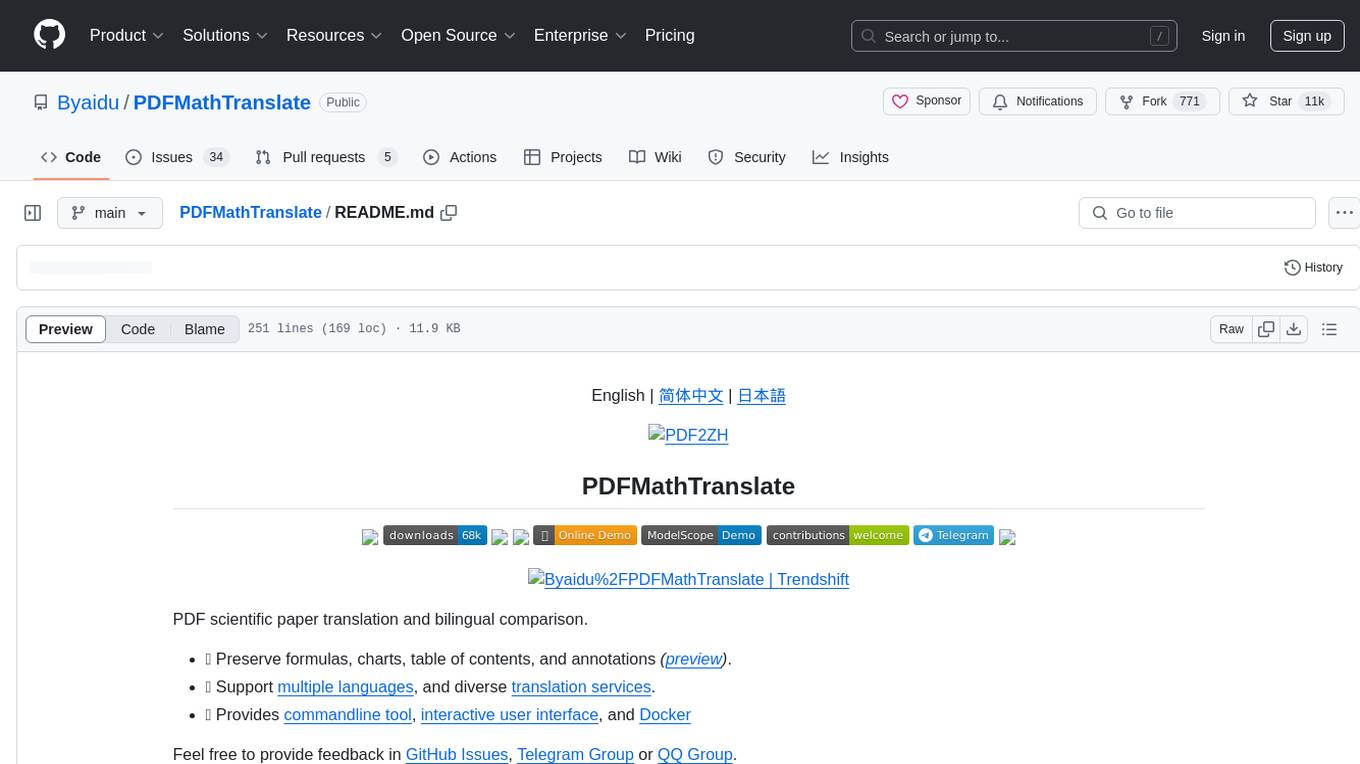
PDFMathTranslate
PDFMathTranslate is a tool designed for translating scientific papers and conducting bilingual comparisons. It preserves formulas, charts, table of contents, and annotations. The tool supports multiple languages and diverse translation services. It provides a command-line tool, interactive user interface, and Docker deployment. Users can try the application through online demos. The tool offers various installation methods including command-line, portable, graphic user interface, and Docker. Advanced options allow users to customize translation settings. Additionally, the tool supports secondary development through APIs for Python and HTTP. Future plans include parsing layout with DocLayNet based models, fixing page rotation and format issues, supporting non-PDF/A files, and integrating plugins for Zotero and Obsidian.
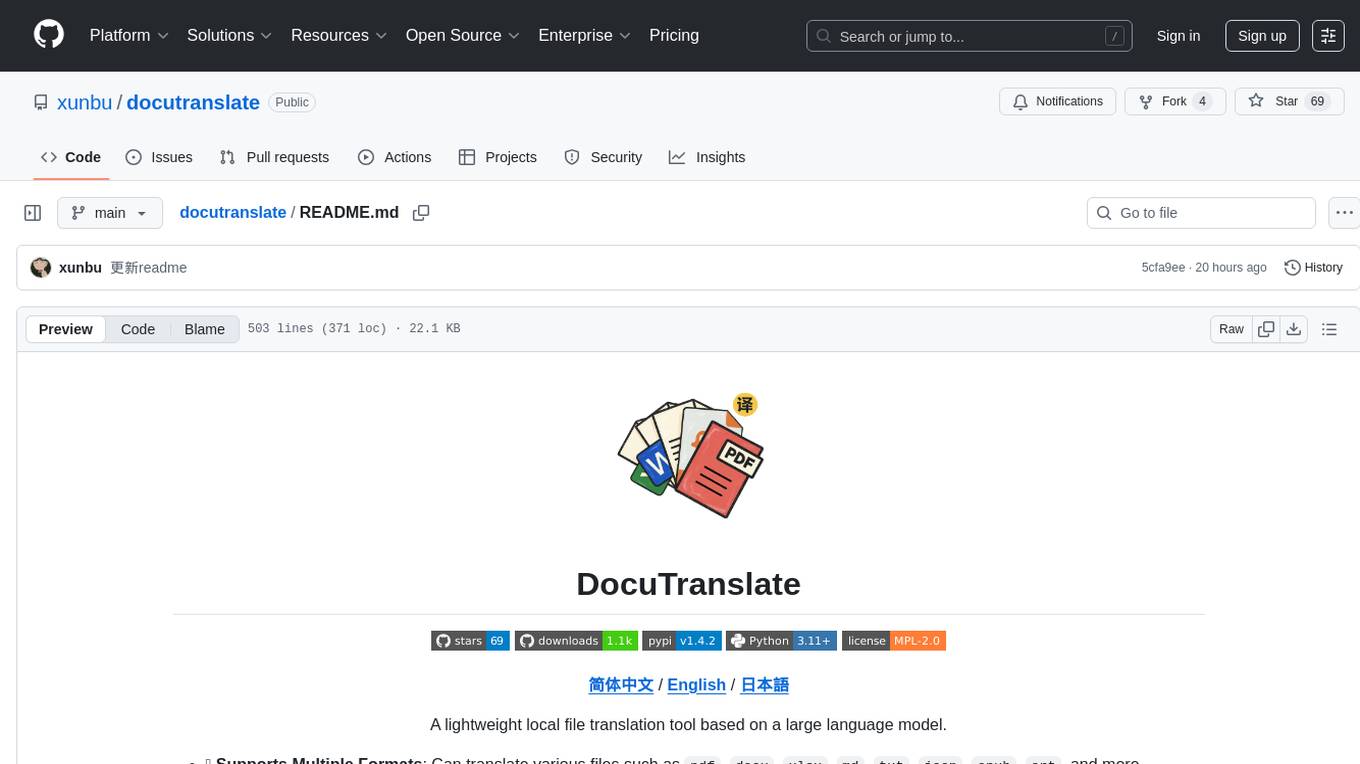
docutranslate
Docutranslate is a versatile tool for translating documents efficiently. It supports multiple file formats and languages, making it ideal for businesses and individuals needing quick and accurate translations. The tool uses advanced algorithms to ensure high-quality translations while maintaining the original document's formatting. With its user-friendly interface, Docutranslate simplifies the translation process and saves time for users. Whether you need to translate legal documents, technical manuals, or personal letters, Docutranslate is the go-to solution for all your document translation needs.
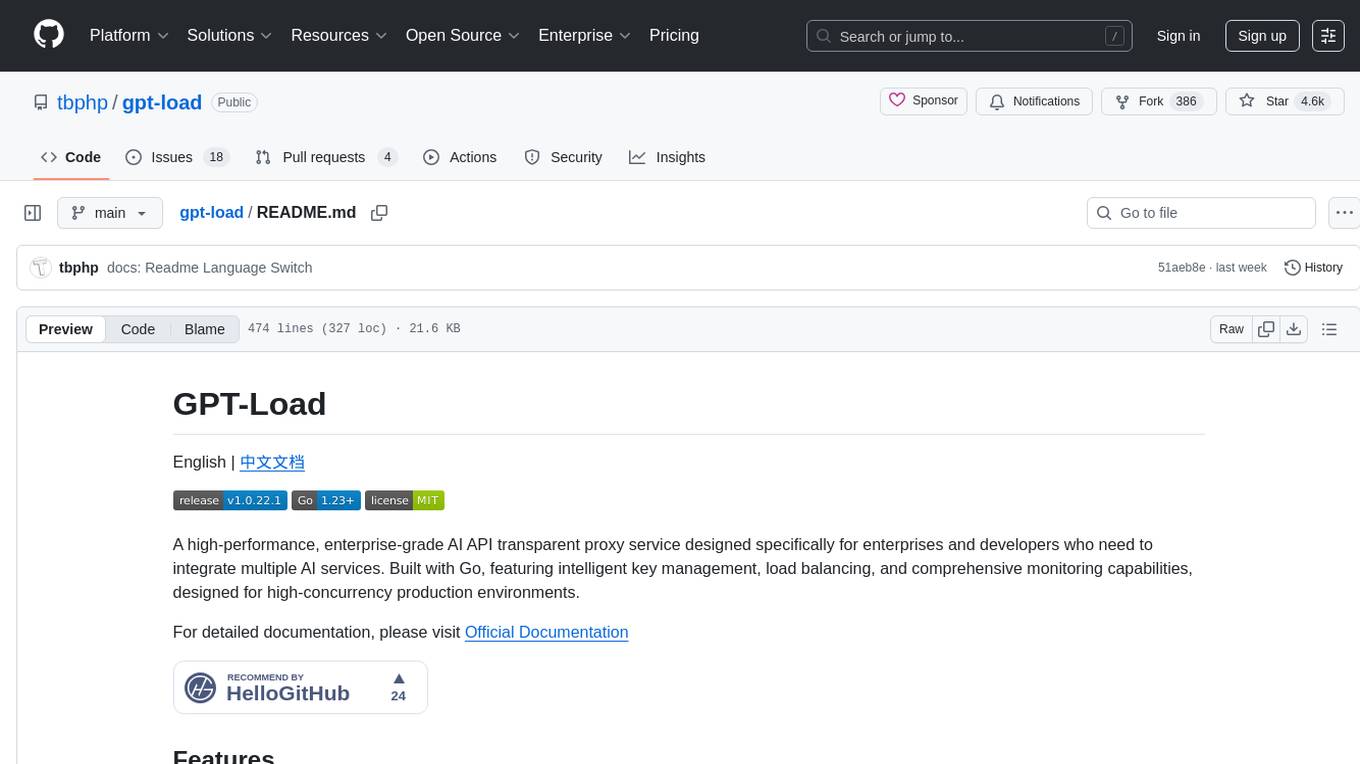
gpt-load
GPT-Load is a high-performance, enterprise-grade AI API transparent proxy service designed for enterprises and developers needing to integrate multiple AI services. Built with Go, it features intelligent key management, load balancing, and comprehensive monitoring capabilities for high-concurrency production environments. The tool serves as a transparent proxy service, preserving native API formats of various AI service providers like OpenAI, Google Gemini, and Anthropic Claude. It supports dynamic configuration, distributed leader-follower deployment, and a Vue 3-based web management interface. GPT-Load is production-ready with features like dual authentication, graceful shutdown, and error recovery.
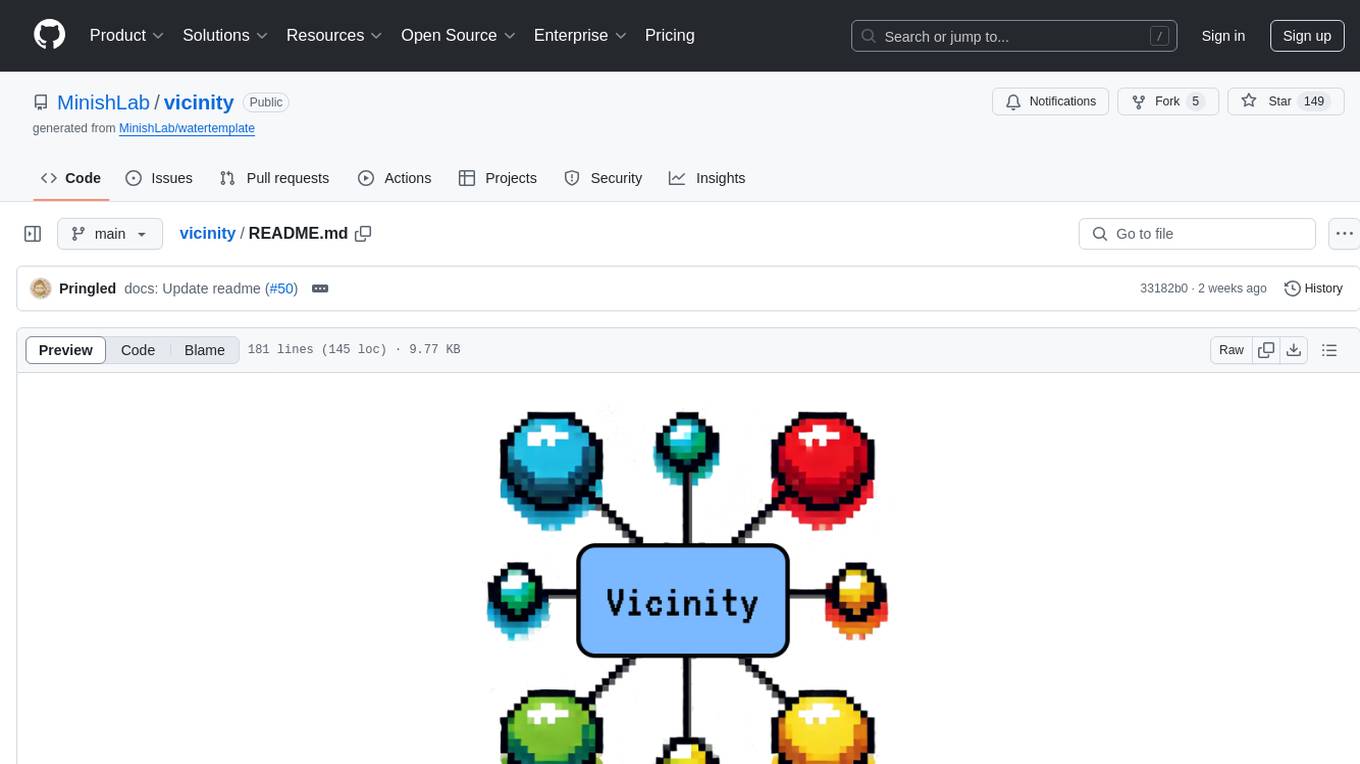
vicinity
Vicinity is a lightweight, low-dependency vector store that provides a unified interface for nearest neighbor search with support for different backends and evaluation. It simplifies the process of comparing and evaluating different nearest neighbors packages by offering a simple and intuitive API. Users can easily experiment with various indexing methods and distance metrics to choose the best one for their use case. Vicinity also allows for measuring performance metrics like queries per second and recall.
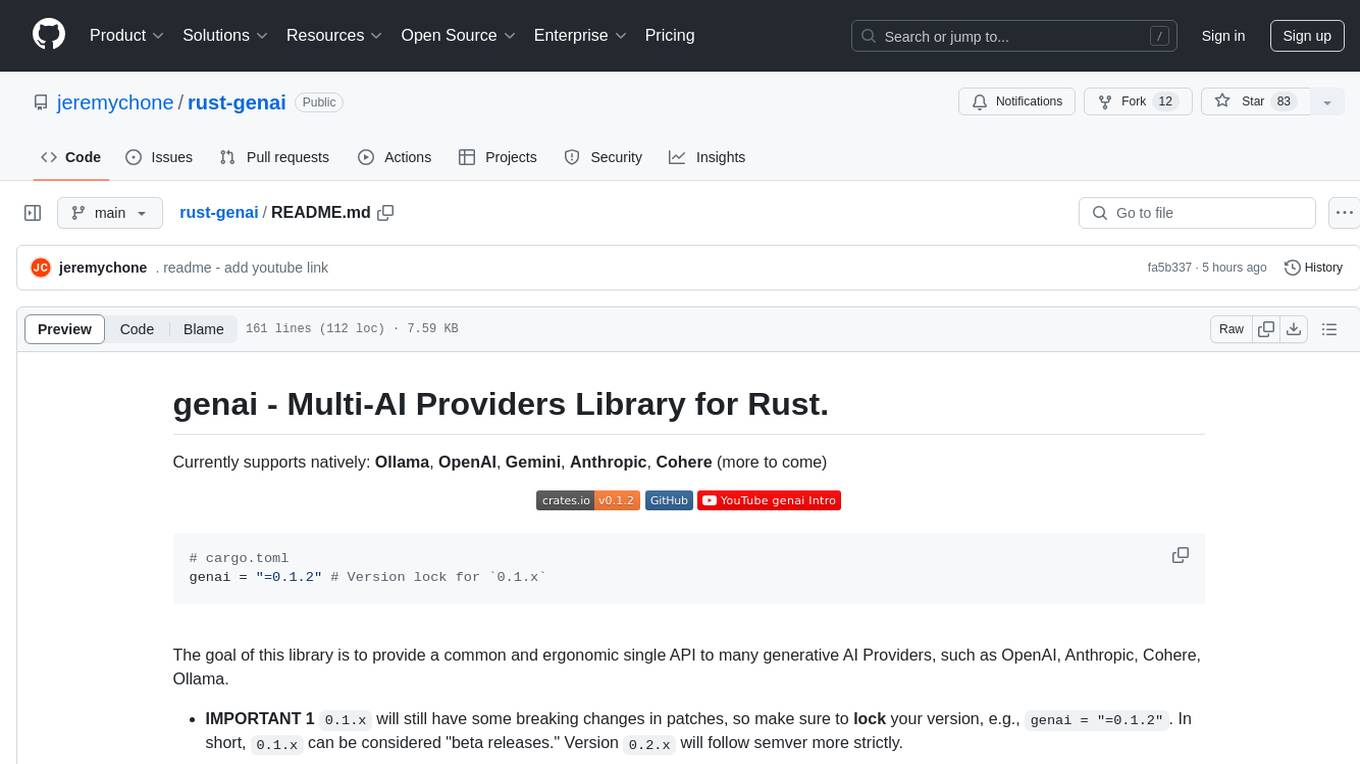
rust-genai
genai is a multi-AI providers library for Rust that aims to provide a common and ergonomic single API to various generative AI providers such as OpenAI, Anthropic, Cohere, Ollama, and Gemini. It focuses on standardizing chat completion APIs across major AI services, prioritizing ergonomics and commonality. The library initially focuses on text chat APIs and plans to expand to support images, function calling, and more in the future versions. Version 0.1.x will have breaking changes in patches, while version 0.2.x will follow semver more strictly. genai does not provide a full representation of a given AI provider but aims to simplify the differences at a lower layer for ease of use.
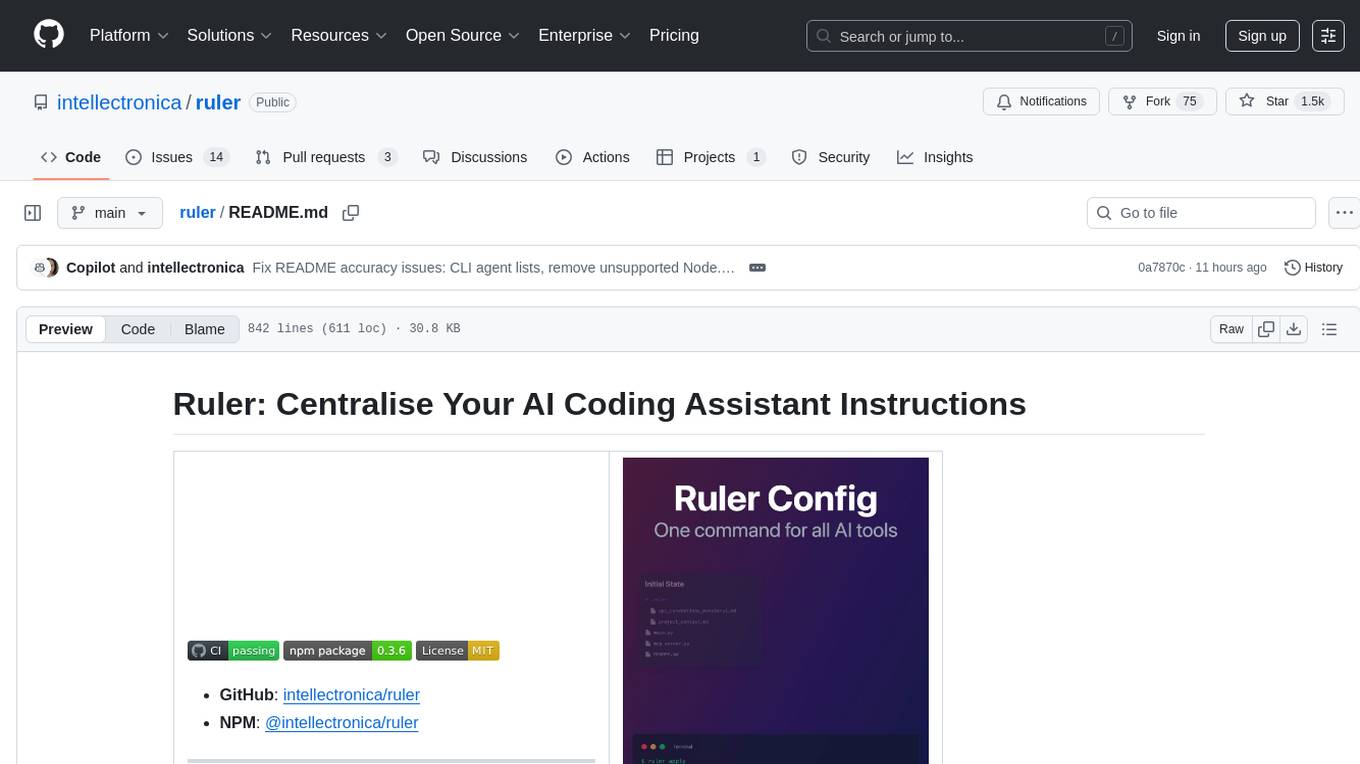
ruler
Ruler is a tool designed to centralize AI coding assistant instructions, providing a single source of truth for managing instructions across multiple AI coding tools. It helps in avoiding inconsistent guidance, duplicated effort, context drift, onboarding friction, and complex project structures by automatically distributing instructions to the right configuration files. With support for nested rule loading, Ruler can handle complex project structures with context-specific instructions for different components. It offers features like centralised rule management, nested rule loading, automatic distribution, targeted agent configuration, MCP server propagation, .gitignore automation, and a simple CLI for easy configuration management.
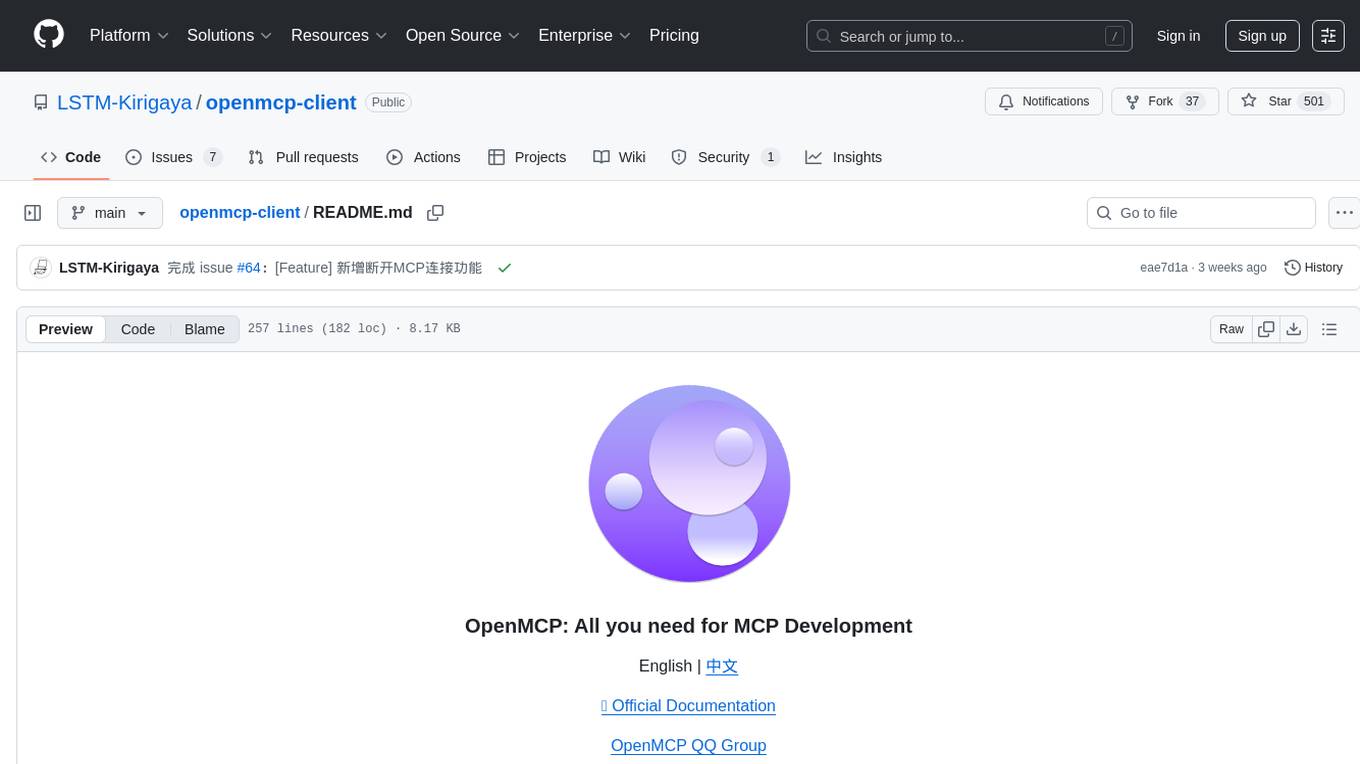
openmcp-client
OpenMCP is an integrated plugin for MCP server debugging in vscode/trae/cursor, combining development and testing functionalities. It includes tools for testing MCP resources, managing large model interactions, project-level management, and supports multiple large models. The openmcp-sdk allows for deploying MCP as an agent app with easy configuration and execution of tasks. The project follows a modular design allowing implementation in different modes on various platforms.
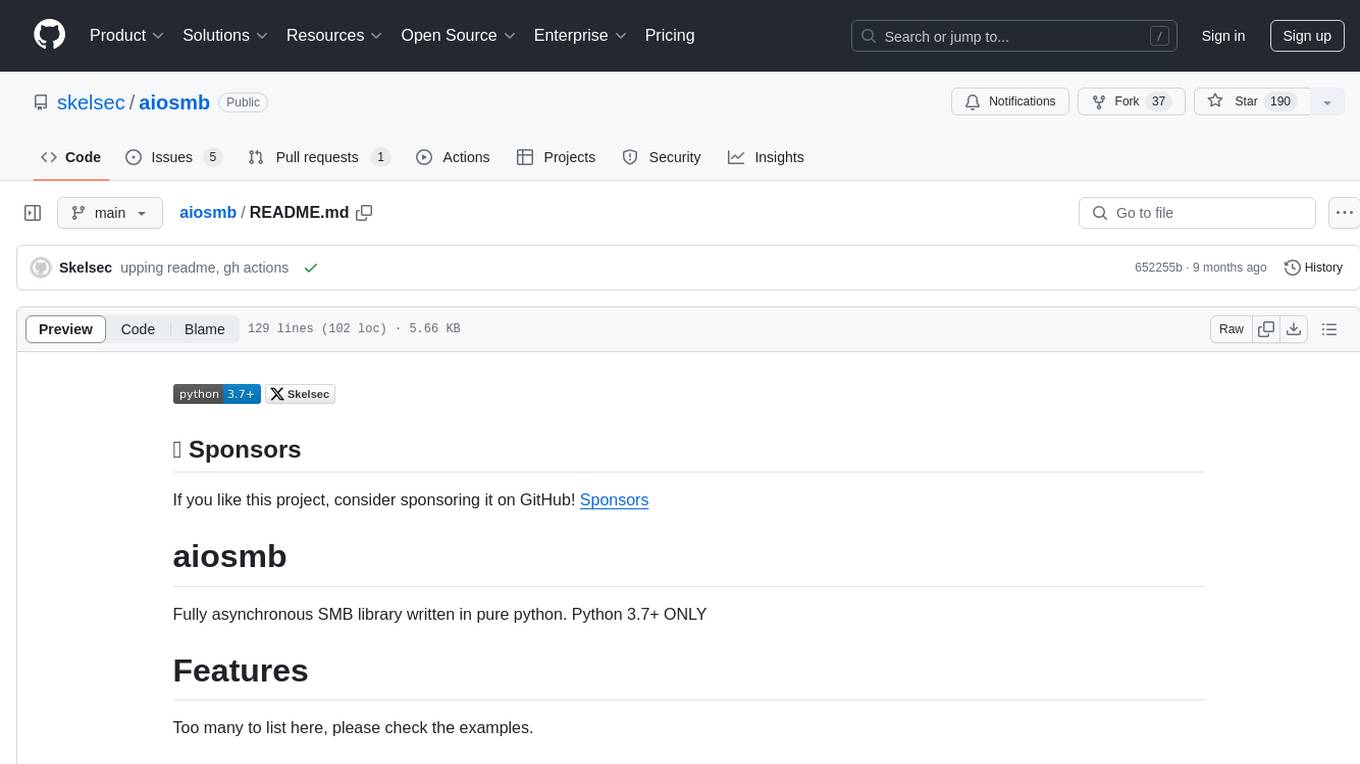
aiosmb
aiosmb is a fully asynchronous SMB library written in pure Python, supporting Python 3.7 and above. It offers various authentication methods such as Kerberos, NTLM, SSPI, and NEGOEX. The library supports connections over TCP and QUIC protocols, with proxy support for SOCKS4 and SOCKS5. Users can specify an SMB connection using a URL format, making it easier to authenticate and connect to SMB hosts. The project aims to implement DCERPC features, VSS mountpoint operations, and other enhancements in the future. It is inspired by Impacket and AzureADJoinedMachinePTC projects.
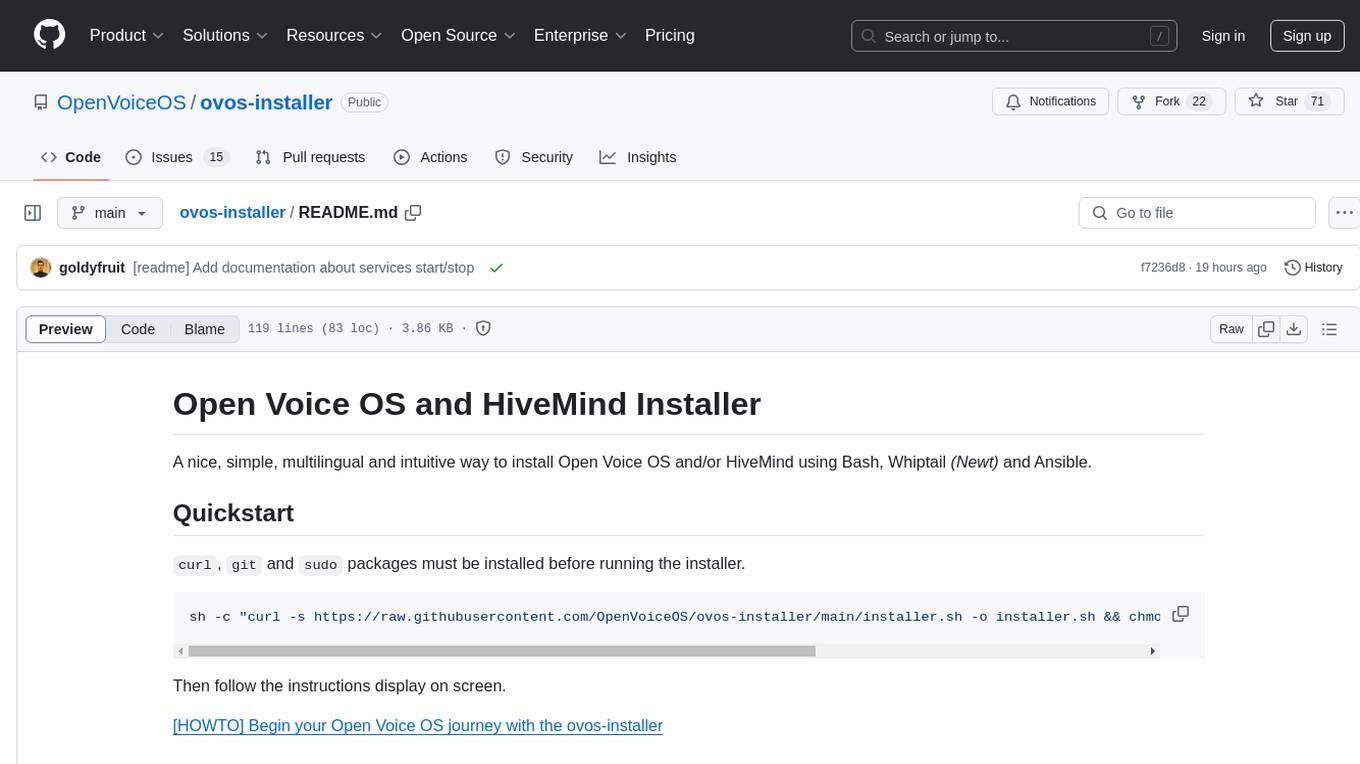
ovos-installer
The ovos-installer is a simple and multilingual tool designed to install Open Voice OS and HiveMind using Bash, Whiptail, and Ansible. It supports various Linux distributions and provides an automated installation process. Users can easily start and stop services, update their Open Voice OS instance, and uninstall the tool if needed. The installer also allows for non-interactive installation through scenario files. It offers a user-friendly way to set up Open Voice OS on different systems.
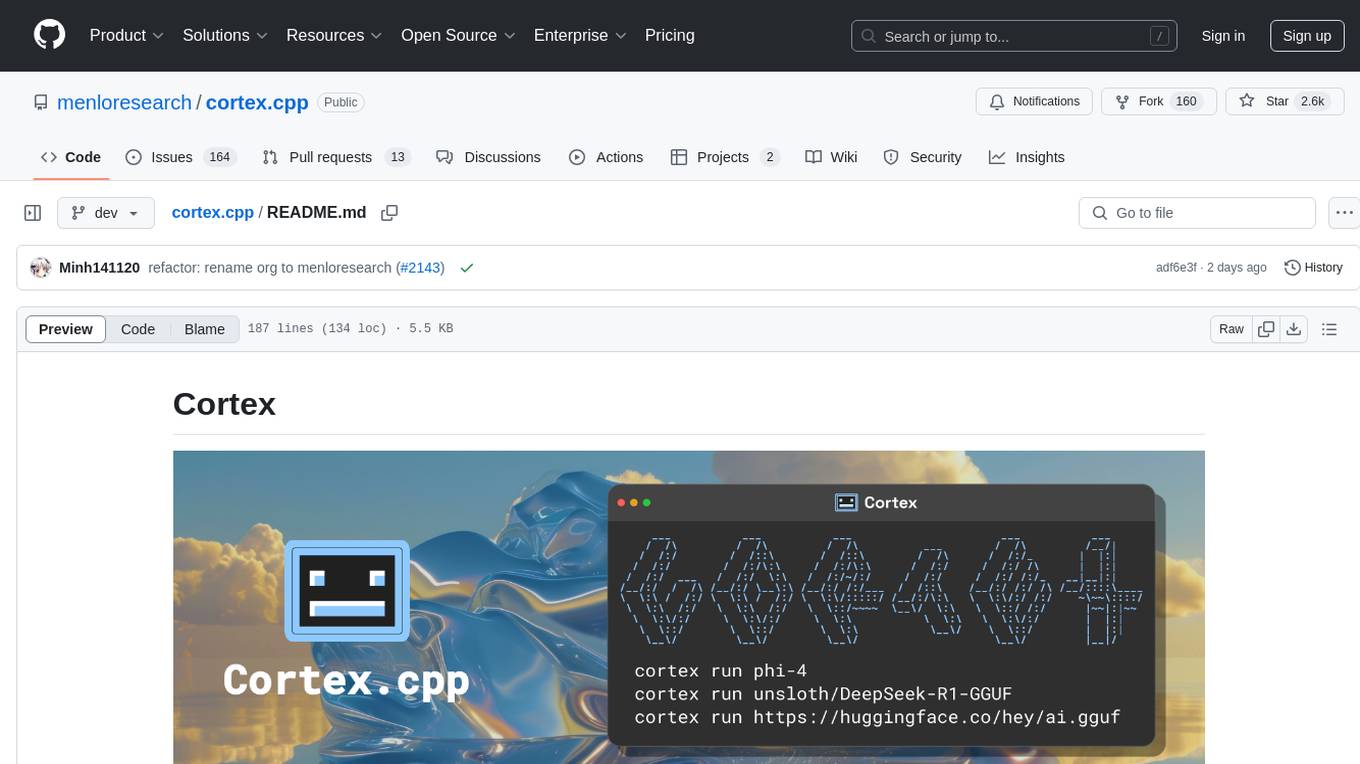
cortex.cpp
Cortex.cpp is an open-source platform designed as the brain for robots, offering functionalities such as vision, speech, language, tabular data processing, and action. It provides an AI platform for running AI models with multi-engine support, hardware optimization with automatic GPU detection, and an OpenAI-compatible API. Users can download models from the Hugging Face model hub, run models, manage resources, and access advanced features like multiple quantizations and engine management. The tool is under active development, promising rapid improvements for users.
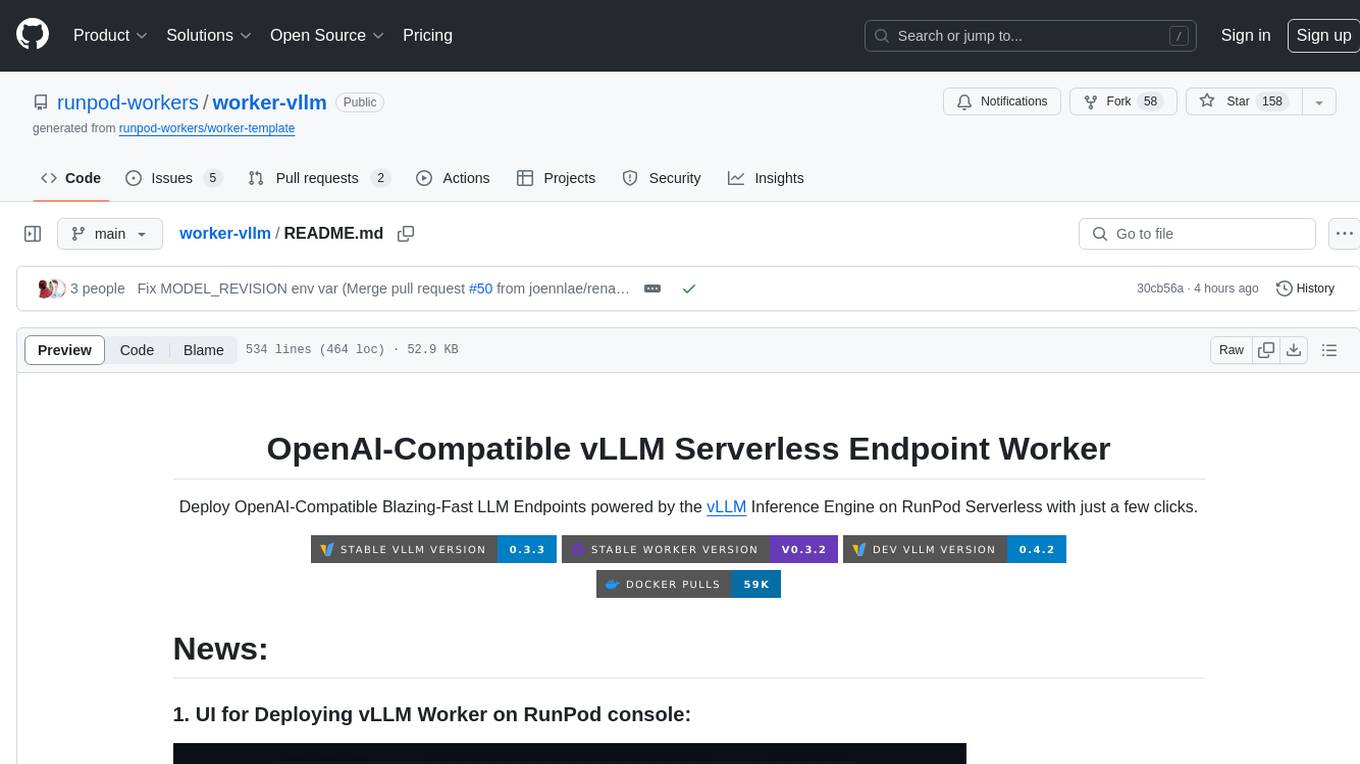
worker-vllm
The worker-vLLM repository provides a serverless endpoint for deploying OpenAI-compatible vLLM models with blazing-fast performance. It supports deploying various model architectures, such as Aquila, Baichuan, BLOOM, ChatGLM, Command-R, DBRX, DeciLM, Falcon, Gemma, GPT-2, GPT BigCode, GPT-J, GPT-NeoX, InternLM, Jais, LLaMA, MiniCPM, Mistral, Mixtral, MPT, OLMo, OPT, Orion, Phi, Phi-3, Qwen, Qwen2, Qwen2MoE, StableLM, Starcoder2, Xverse, and Yi. Users can deploy models using pre-built Docker images or build custom images with specified arguments. The repository also supports OpenAI compatibility for chat completions, completions, and models, with customizable input parameters. Users can modify their OpenAI codebase to use the deployed vLLM worker and access a list of available models for deployment.
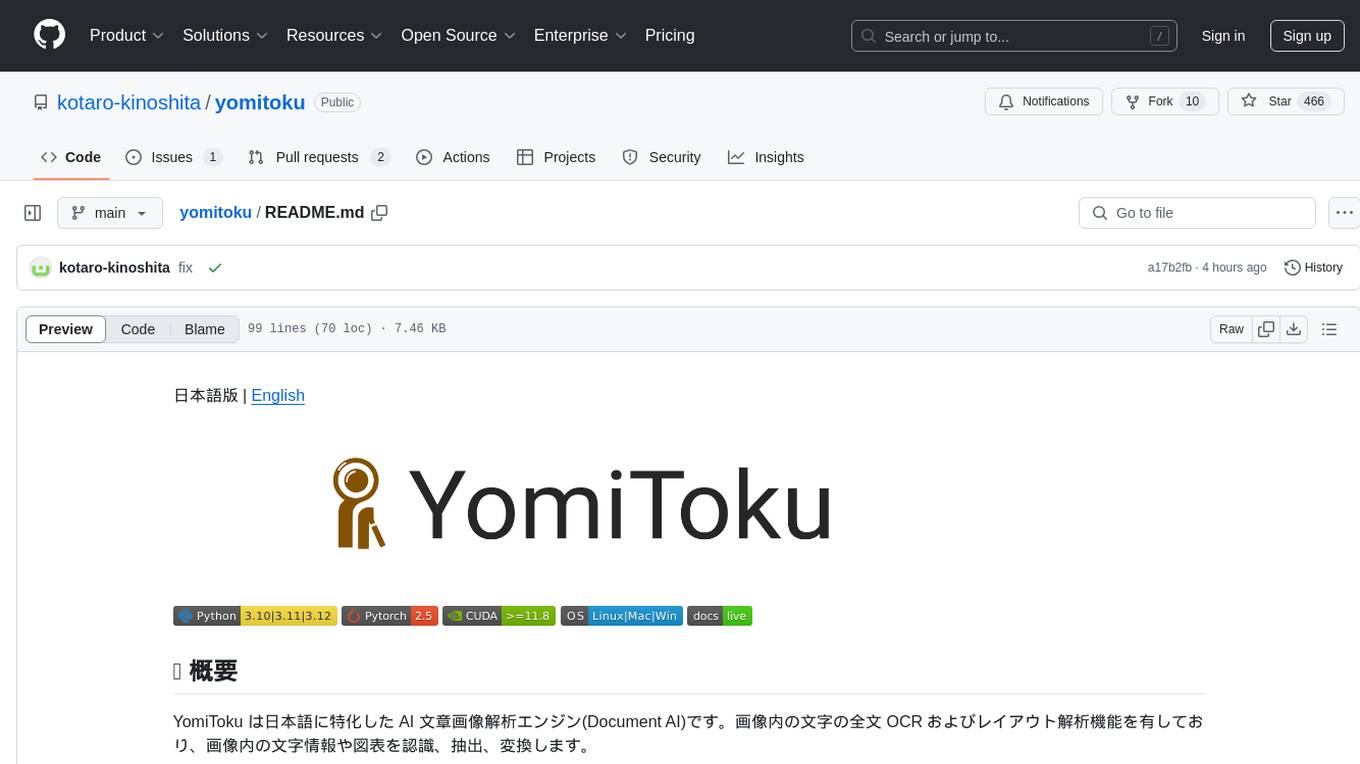
yomitoku
YomiToku is a Japanese-focused AI document image analysis engine that provides full-text OCR and layout analysis capabilities for images. It recognizes, extracts, and converts text information and figures in images. It includes 4 AI models trained on Japanese datasets for tasks such as detecting text positions, recognizing text strings, analyzing layouts, and recognizing table structures. The models are specialized for Japanese document images, supporting recognition of over 7000 Japanese characters and analyzing layout structures specific to Japanese documents. It offers features like layout analysis, table structure analysis, and reading order estimation to extract information from document images without disrupting their semantic structure. YomiToku supports various output formats such as HTML, markdown, JSON, and CSV, and can also extract figures, tables, and images from documents. It operates efficiently in GPU environments, enabling fast and effective analysis of document transcriptions without requiring high-end GPUs.
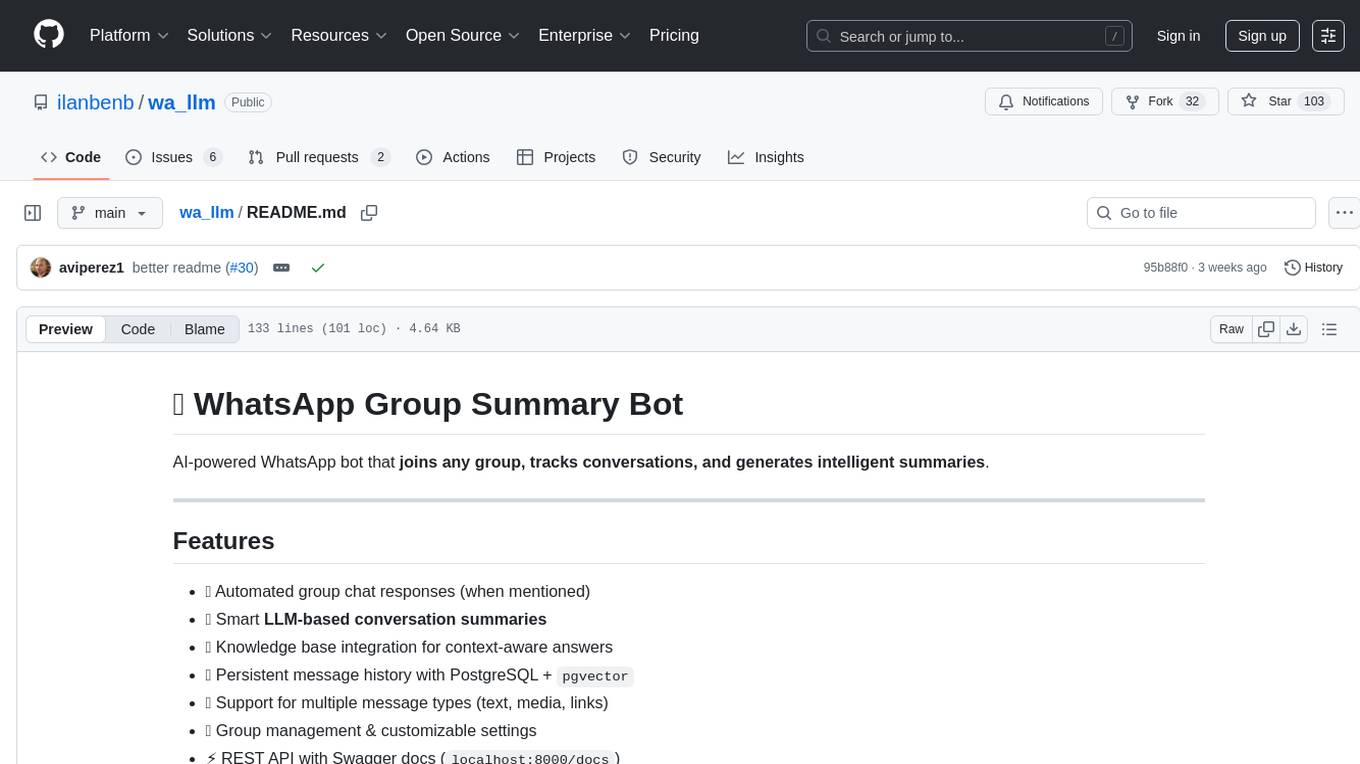
wa_llm
WhatsApp Group Summary Bot is an AI-powered tool that joins WhatsApp groups, tracks conversations, and generates intelligent summaries. It features automated group chat responses, LLM-based conversation summaries, knowledge base integration, persistent message history with PostgreSQL, support for multiple message types, group management, and a REST API with Swagger docs. Prerequisites include Docker, Python 3.12+, PostgreSQL with pgvector extension, Voyage AI API key, and a WhatsApp account for the bot. The tool can be quickly set up by cloning the repository, configuring environment variables, starting services, and connecting devices. It offers API usage for loading new knowledge base topics and generating & dispatching summaries to managed groups. The project architecture includes FastAPI backend, WhatsApp Web API client, PostgreSQL database with vector storage, and AI-powered message processing.
For similar tasks

atlas-mcp-server
ATLAS (Adaptive Task & Logic Automation System) is a high-performance Model Context Protocol server designed for LLMs to manage complex task hierarchies. Built with TypeScript, it features ACID-compliant storage, efficient task tracking, and intelligent template management. ATLAS provides LLM Agents task management through a clean, flexible tool interface. The server implements the Model Context Protocol (MCP) for standardized communication between LLMs and external systems, offering hierarchical task organization, task state management, smart templates, enterprise features, and performance optimization.
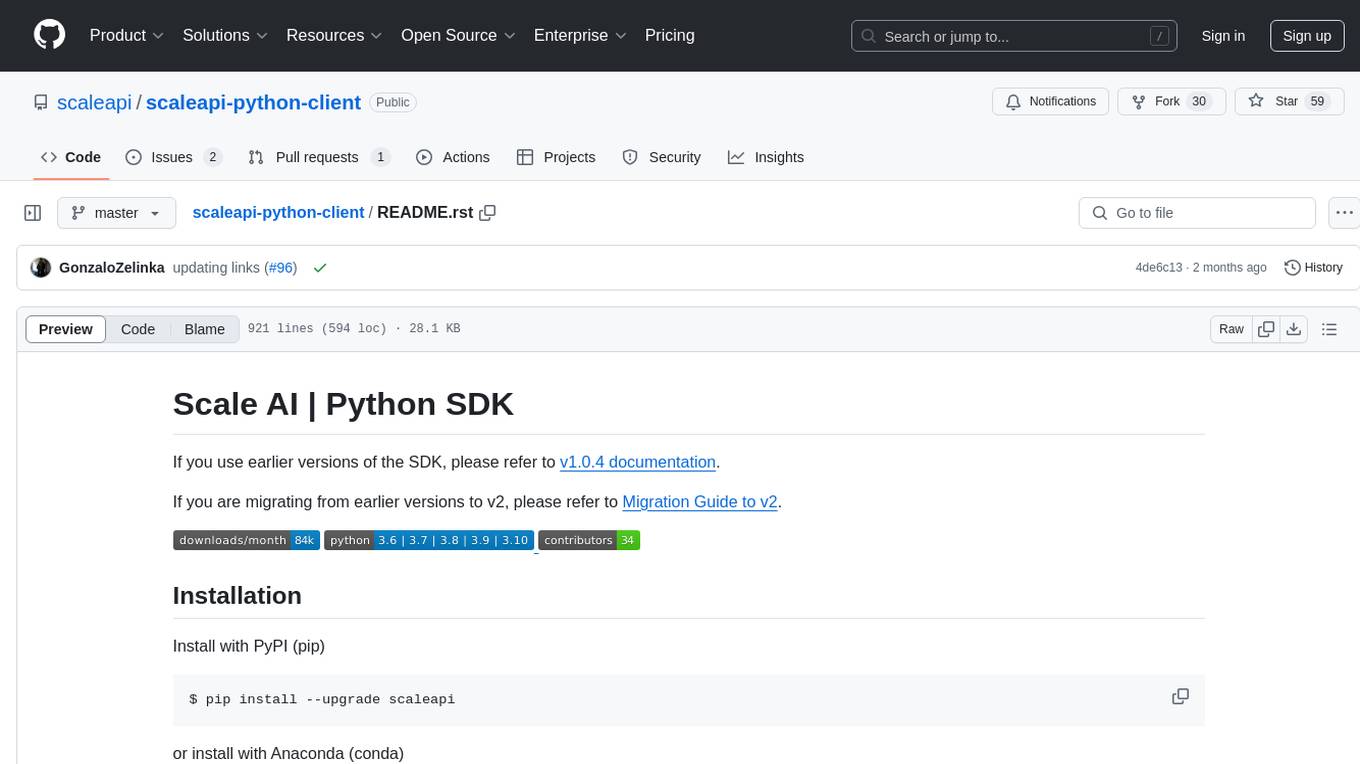
scaleapi-python-client
The Scale AI Python SDK is a tool that provides a Python interface for interacting with the Scale API. It allows users to easily create tasks, manage projects, upload files, and work with evaluation tasks, training tasks, and Studio assignments. The SDK handles error handling and provides detailed documentation for each method. Users can also manage teammates, project groups, and batches within the Scale Studio environment. The SDK supports various functionalities such as creating tasks, retrieving tasks, canceling tasks, auditing tasks, updating task attributes, managing files, managing team members, and working with evaluation and training tasks.
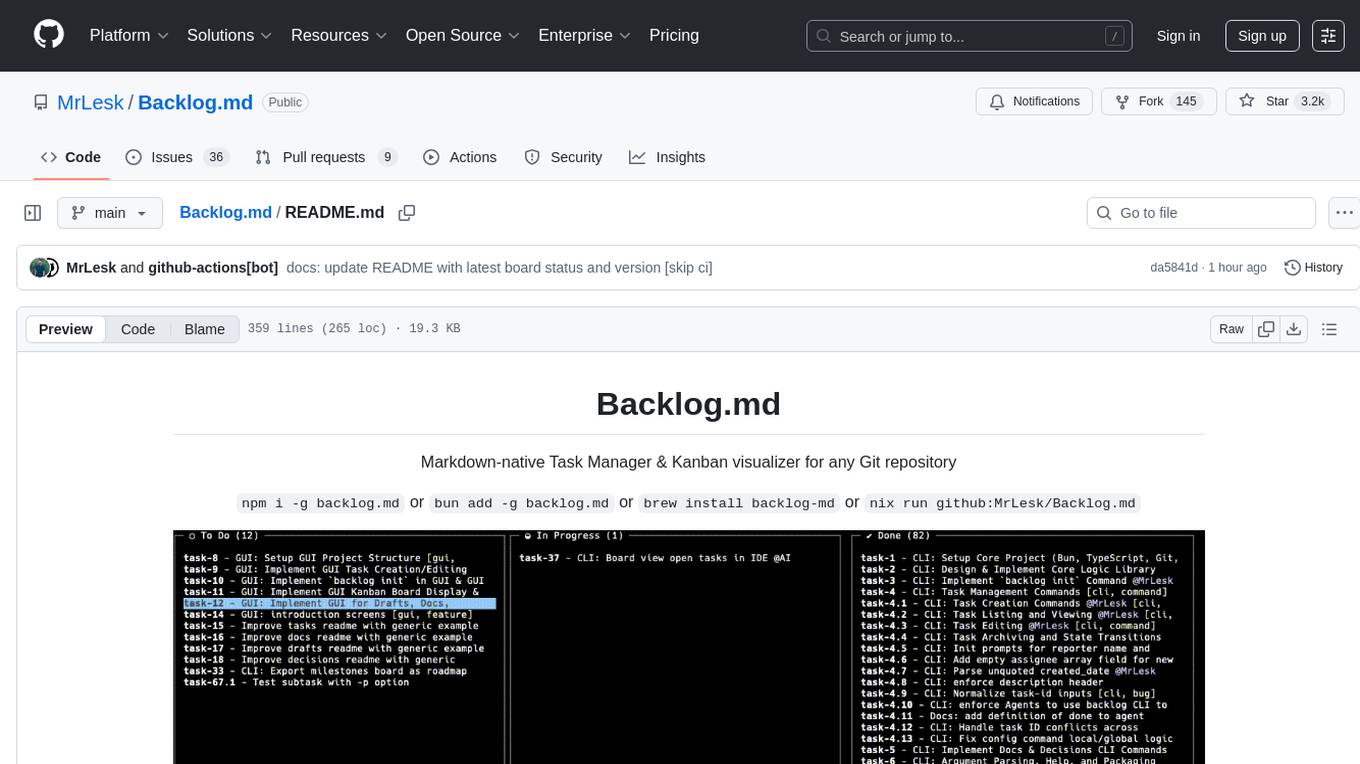
Backlog.md
Backlog.md is a Markdown-native Task Manager & Kanban visualizer for any Git repository. It turns any folder with a Git repo into a self-contained project board powered by plain Markdown files and a zero-config CLI. Features include managing tasks as plain .md files, private & offline usage, instant terminal Kanban visualization, board export, modern web interface, AI-ready CLI, rich query commands, cross-platform support, and MIT-licensed open-source. Users can create tasks, view board, assign tasks to AI, manage documentation, make decisions, and configure settings easily.
For similar jobs

kaito
Kaito is an operator that automates the AI/ML inference model deployment in a Kubernetes cluster. It manages large model files using container images, avoids tuning deployment parameters to fit GPU hardware by providing preset configurations, auto-provisions GPU nodes based on model requirements, and hosts large model images in the public Microsoft Container Registry (MCR) if the license allows. Using Kaito, the workflow of onboarding large AI inference models in Kubernetes is largely simplified.

ai-on-gke
This repository contains assets related to AI/ML workloads on Google Kubernetes Engine (GKE). Run optimized AI/ML workloads with Google Kubernetes Engine (GKE) platform orchestration capabilities. A robust AI/ML platform considers the following layers: Infrastructure orchestration that support GPUs and TPUs for training and serving workloads at scale Flexible integration with distributed computing and data processing frameworks Support for multiple teams on the same infrastructure to maximize utilization of resources

tidb
TiDB is an open-source distributed SQL database that supports Hybrid Transactional and Analytical Processing (HTAP) workloads. It is MySQL compatible and features horizontal scalability, strong consistency, and high availability.

nvidia_gpu_exporter
Nvidia GPU exporter for prometheus, using `nvidia-smi` binary to gather metrics.

tracecat
Tracecat is an open-source automation platform for security teams. It's designed to be simple but powerful, with a focus on AI features and a practitioner-obsessed UI/UX. Tracecat can be used to automate a variety of tasks, including phishing email investigation, evidence collection, and remediation plan generation.

openinference
OpenInference is a set of conventions and plugins that complement OpenTelemetry to enable tracing of AI applications. It provides a way to capture and analyze the performance and behavior of AI models, including their interactions with other components of the application. OpenInference is designed to be language-agnostic and can be used with any OpenTelemetry-compatible backend. It includes a set of instrumentations for popular machine learning SDKs and frameworks, making it easy to add tracing to your AI applications.

BricksLLM
BricksLLM is a cloud native AI gateway written in Go. Currently, it provides native support for OpenAI, Anthropic, Azure OpenAI and vLLM. BricksLLM aims to provide enterprise level infrastructure that can power any LLM production use cases. Here are some use cases for BricksLLM: * Set LLM usage limits for users on different pricing tiers * Track LLM usage on a per user and per organization basis * Block or redact requests containing PIIs * Improve LLM reliability with failovers, retries and caching * Distribute API keys with rate limits and cost limits for internal development/production use cases * Distribute API keys with rate limits and cost limits for students

kong
Kong, or Kong API Gateway, is a cloud-native, platform-agnostic, scalable API Gateway distinguished for its high performance and extensibility via plugins. It also provides advanced AI capabilities with multi-LLM support. By providing functionality for proxying, routing, load balancing, health checking, authentication (and more), Kong serves as the central layer for orchestrating microservices or conventional API traffic with ease. Kong runs natively on Kubernetes thanks to its official Kubernetes Ingress Controller.





